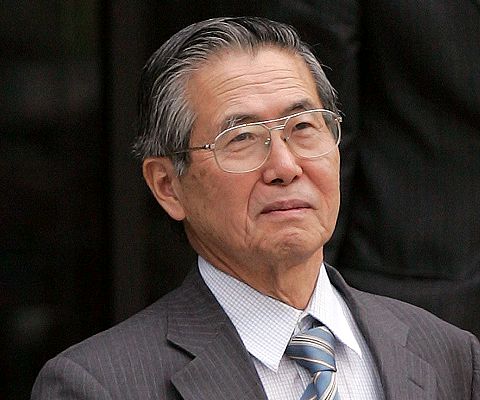
Former President of Peru Alberto Fujimori
When the son of Japanese immigrants was elected to Peru’s presidential palace in 1990, most Peruvians were thrilled. Finally, someone “like them” — not white, not born to privilege, a hard worker — was in power. People called him “el chinito,” the Little Chinaman, in an entirely affectionate and appreciative way.
That enthusiasm didn’t last long. First came the economic “shocks,” which left millions with worthless money and goods they couldn’t sell. The war that devastated the highlands moved decisively to the cities. The biggest car bomb in the country’s history killed 24 in the upscale Miraflores neighborhood.
An equally ominous series of death squad killings linked to Peru’s leading teachers’ college made it clear that the government itself was involved in an Argentina-style dirty war.
Yesterday, the politician once heralded as the hope of the cholo, or mixed race, majority was sentenced to 25 years in prison for his hand in creating that death squad. Known as the Grupo Colina, it included former Army and police members. Although some Grupo Colina members were tried, as president, Fujimori signed a law that granted amnesty to anyone accused of, tried for, convicted of, or sentenced for human rights violations perpetrated by the security forces.
Really.
When a court ruled the amnesty unconstitutional, Fujimori responded by signing another law, drafted by his legislative supporters, to bar judicial review of the amnesty laws, thus ensuring that criminals would go unpunished. Eventually, both of these laws were repealed.
Fujimori is not the first to be prosecuted for the Colina killings. Julio Salazar, a former intelligence chief, was sentenced to thirty-five years for his role in the La Cantuta massacre. His boss, Vladimiro Montesinos, is also in prison, facing trialon dozens of offenses including murder, arms trafficking, drug trafficking, and political corruption.
Human rights advocates should take heart from this. Throughout the world, the idea of justice for serious human rights crimes is gaining real force. It can come through international efforts by the International Criminal Court or special tribunals — or it can come from a national justice system supported by other countries (Chile extradited an unwitting Fujimori to Peru in 2007) and revitalized by investment, support and a new generation of citezens.
Que viva el Peru!
